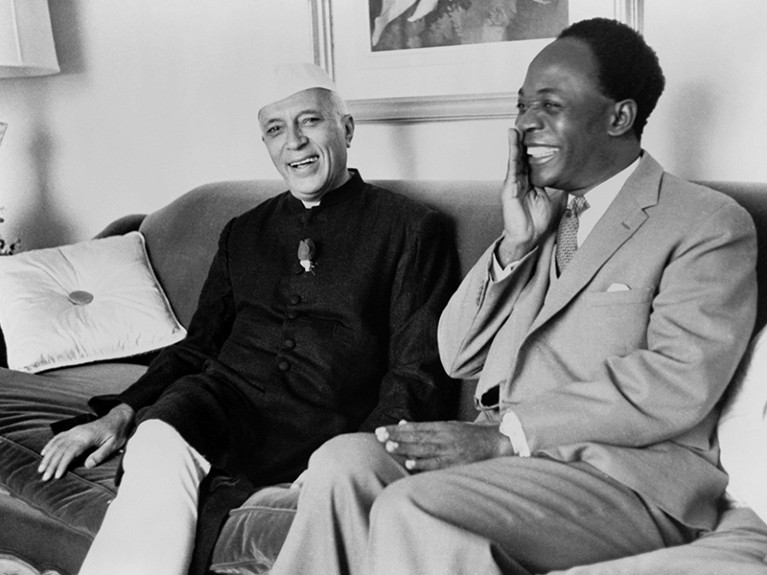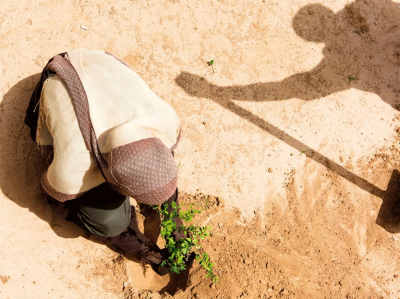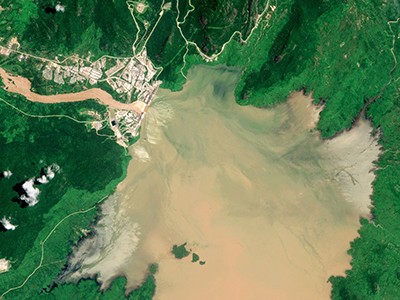
Kwame Nkrumah, pictured with Jawaharlal Nehru, India’s first prime minister after independence from Britain.Credit: Everett Collection Historical/Alamy
It is within the possibility of science and technology to make even the Sahara bloom into a vast field with verdant vegetation.” These words, which still hold true today, were spoken by Kwame Nkrumah, educator, political theorist and the first president of independent Ghana. Nkrumah made the remarks in a landmark speech some 60 years ago at the launch of the Organisation of African Unity (OAU). The OAU has since been succeeded by the African Union (AU), and the leaders of its 55 member states met last weekend for their annual summit in Addis Ababa.
There have been some notable successes in advancing Nkrumah and his successors’ vision for scientific cooperation across Africa. One is the creation of the Africa Centres for Disease Control and Prevention, based in Addis Ababa, in 2016. The founding of the African Institute for Mathematical Sciences, which is now more than two decades old, is another. An African Medicines Agency that would harmonize approvals for new medicines is at an advanced stage of development. And the Great Green Wall project to tackle land degradation across borders, although beset by many problems, offers another example of states willingly setting aside their differences in an effort to achieve shared goals.
Is Africa’s Great Green Wall project withering?
But funding, especially for smaller-scale collaborations, remains a perennial sticking point. African countries share many challenges that science can help to overcome, among them food insecurity, climate adaptation and conflict, which are also priorities for the United Nations Sustainable Development Goals (SDGs).
Studies show that researchers in low- and middle-income countries are more focused on the SDGs than are their counterparts in high-income nations. However, the AU does not have a continent-wide fund that would allow African researchers to work together on these shared challenges. Such a fund would not necessarily need to run to hundreds of millions of dollars. It could start small, providing grants for travel to meetings and conferences, for example, or for the development of larger research proposals, or fees to pay for specific training courses. But it is needed.
A decade ago, the AU and the African Development Bank, based in Abidjan, Côte d’Ivoire, began work on establishing a research and innovation fund. Its scope has since been expanded to include education, and it is now called the African Education, Science, Technology and Innovation Fund. Countries were asked to contribute US$2 million each, which would be matched by the bank from its own sources. Progress has been slow. So far, only Botswana and Ghana have committed funding. The fund’s overall size has been set at $300 million, but who else will contribute and eligibility criteria for funding applications are yet to be worked out. The fund needs to become a priority, say the authors of a review of AU science policies over the past decade, commissioned by the AU and the UN science agency UNESCO, and published at the end of last year (see go.nature.com/3sixqis). Ultimately, that means more heads of government will need to authorize the required finance.
A row is raging over Africa’s largest dam — science has a solution
The continent’s leaders do, of course, have more immediate concerns. Many countries are still gripped by an economic crisis that followed the COVID-19 pandemic and Russia’s 2022 invasion of Ukraine. There are also tensions between some of the union’s bigger and more influential member states. Ethiopia, which hosts the AU’s head offices, is at loggerheads with Egypt over the construction of a dam, and with Somalia over access to a seaport. Other nations have problems at home. In Sudan, some 13,000 people have been killed and 6 million displaced since April 2023, as a result of armed conflict. And this week, Senegal has seen huge protests after President Macky Sall controversially decided to delay elections. But there must be room on the agenda for forward-looking projects, too.
These are also rocky times for other regional unions, not least the European Union, which works closely with — and provides considerable financial support to — the AU. It has lost one of its biggest members, the United Kingdom, as a result of Brexit, and is considering taking legal action against Hungary for violating democratic principles. Europe is also seeing a rise in popular support for parties that do not agree with many EU laws.
Rifts in national and regional unions inevitably affect scientific cooperation between members. But in the history of such unions, including both the EU and the AU, leaders have generally recognized that there is more to be gained by permitting collaboration between people and institutions than by stopping it.
By the 1960s, Nkrumah, who had spent a decade studying in the United States in the 1930s and 1940s, wanted for Africa what he saw the United States and European nations achieving. When he spoke at the OAU’s launch in 1963, he noted that “there is hardly any African state without a frontier problem with its adjacent neighbours”. He helped African countries to establish the OAU despite the divisions that existed between them.
The continent’s researchers need their leaders to show that they are capable of the same forward-thinking now. Science is crucial to solving shared challenges such as hunger and environmental degradation. An Africa-wide fund, even a modest one, will also spark collaborations that could help to create or strengthen bonds of unity. And that alone would be no small win.

 Is Africa’s Great Green Wall project withering?
Is Africa’s Great Green Wall project withering?
 A row is raging over Africa’s largest dam — science has a solution
A row is raging over Africa’s largest dam — science has a solution
 Rich countries must align science funding with the SDGs
Rich countries must align science funding with the SDGs
 How COVID spurred Africa to plot a vaccines revolution
How COVID spurred Africa to plot a vaccines revolution







